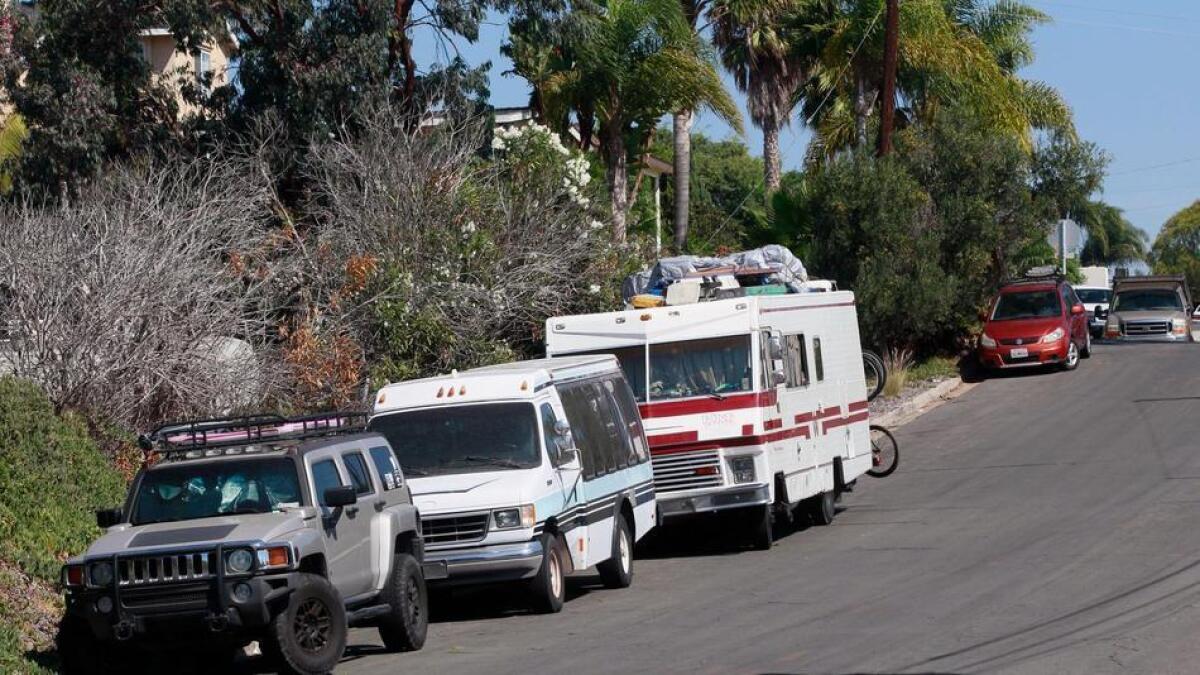Judge orders San Diego to stop ticketing homeless people living in vehicles

- Share via
Reporting from San Diego — A federal judge has ordered San Diego to stop ticketing homeless people for living inside vehicles, calling the city’s longtime law prohibiting such behavior too vague for effective enforcement.
The injunction issued by U.S. District Judge Anthony Battaglia on Tuesday is a victory for disabled homeless people living in recreational vehicles who filed suit last year over the law, which they claim is discriminatory.
While the injunction will be in place only until Battaglia makes a ruling in the case, the judge said he expects to eventually rule in favor of the homeless people.
“The court finds plaintiffs have shown a likelihood of success on the merits of their claim that the ordinance is vague because it fails to alert the public what behavior is lawful and what behavior is prohibited,” Battaglia wrote.
He said the vehicle habitation law doesn’t indicate specifically what turns a vehicle into a person’s home or “living quarters,” noting that people have gotten tickets under the law for reading a book inside their vehicle.
Before the lawsuit was filed last November, San Diego officials and lawyers for the group of homeless people discussed potential changes in enforcement that would allow displaced RV owners to park their recreational vehicles somewhere legally.
This week’s injunction could allow the two sides to revisit those discussions and come up with a solution.
In addition to prohibiting the city from issuing tickets, the injunction prevents the city from impounding vehicles under the ordinance and from pursuing any outstanding tickets that have been issued but not prosecuted.
Battaglia gave city officials 30 days to submit a report to the court detailing how San Diego has complied with the order.
A spokeswoman for City Atty. Mara Elliott declined on Wednesday to discuss the order, saying in an email only that “we will review the ruling and advise our client.”
San Diego got some good news from Battaglia, who said a separate city ordinance prohibiting overnight parking of recreational and other oversized vehicles appears to be legally sound.
The lawsuit filed by the disabled homeless group targets that ordinance as discriminatory, in addition to the vehicle habitation law.
The suit claims both laws illegally prevent disabled homeless people from living and sleeping in recreational vehicles parked overnight on city streets.
The overnight parking ordinance, enacted by the city in 2014, prohibits such vehicles from parking on any San Diego city street or in any public parking lot between 2 and 6 a.m.
Battaglia declined on Tuesday to block that law, contending that the homeless people and their attorneys didn’t demonstrate that it has been applied in a discriminatory way.
He also wrote that the law doesn’t appear to suffer from the same vagueness as the vehicle habitation law.
“While the court sympathizes that this ordinance leaves plaintiffs with nowhere to park between these hours and is decidedly unfair, the law is not ambiguous, unclear or vague in any way,” Battaglia wrote.
Special parking lots established last year in San Diego allow overnight parking for homeless individuals, but they don’t accept RVs and have far fewer spaces than the estimated 1,000 homeless people living in vehicles locally.
The city “safe” lots also require users to apply for slots in local shelters, a move that doesn’t make sense for most disabled homeless people living in RVs because shelters aren’t appropriate environments for them, the suit says.
Regarding shelters, the lawsuit says that people who are physically disabled may struggle with stairs and that those with mental health problems don’t function well in noisy, dirty, unsafe and overcrowded conditions where there is a lack of privacy.
The lawsuit says the RV law and vehicle habitation ordinance both violate numerous U.S. and state constitutional rights, including the 8th Amendment prohibition on cruel and unusual punishment and the 14th Amendment due process protections.
Enforcement of the two laws also violates the anti-discrimination protections of Title II of the Americans with Disabilities Act of 1990, the suit says.
In June, attorneys for the city argued the laws are neutral and can’t be challenged under disability discrimination laws because they apply to everyone regardless of disability status.
Battaglia, however, said in June that a policy “can violate the Americans with Disabilities Act and Rehabilitation Act if it disparately impacts or places a disproportionate burden on the disabled.”
The litigation, filed on behalf of nine disabled homeless people, is a class-action lawsuit.
It was filed by Disability Rights California and the National Law Center on Homelessness & Poverty. Attorneys for both organizations couldn’t be reached for comment on Wednesday.
Garrick writes for the San Diego Union-Tribune.
More to Read
Sign up for Essential California
The most important California stories and recommendations in your inbox every morning.
You may occasionally receive promotional content from the Los Angeles Times.













